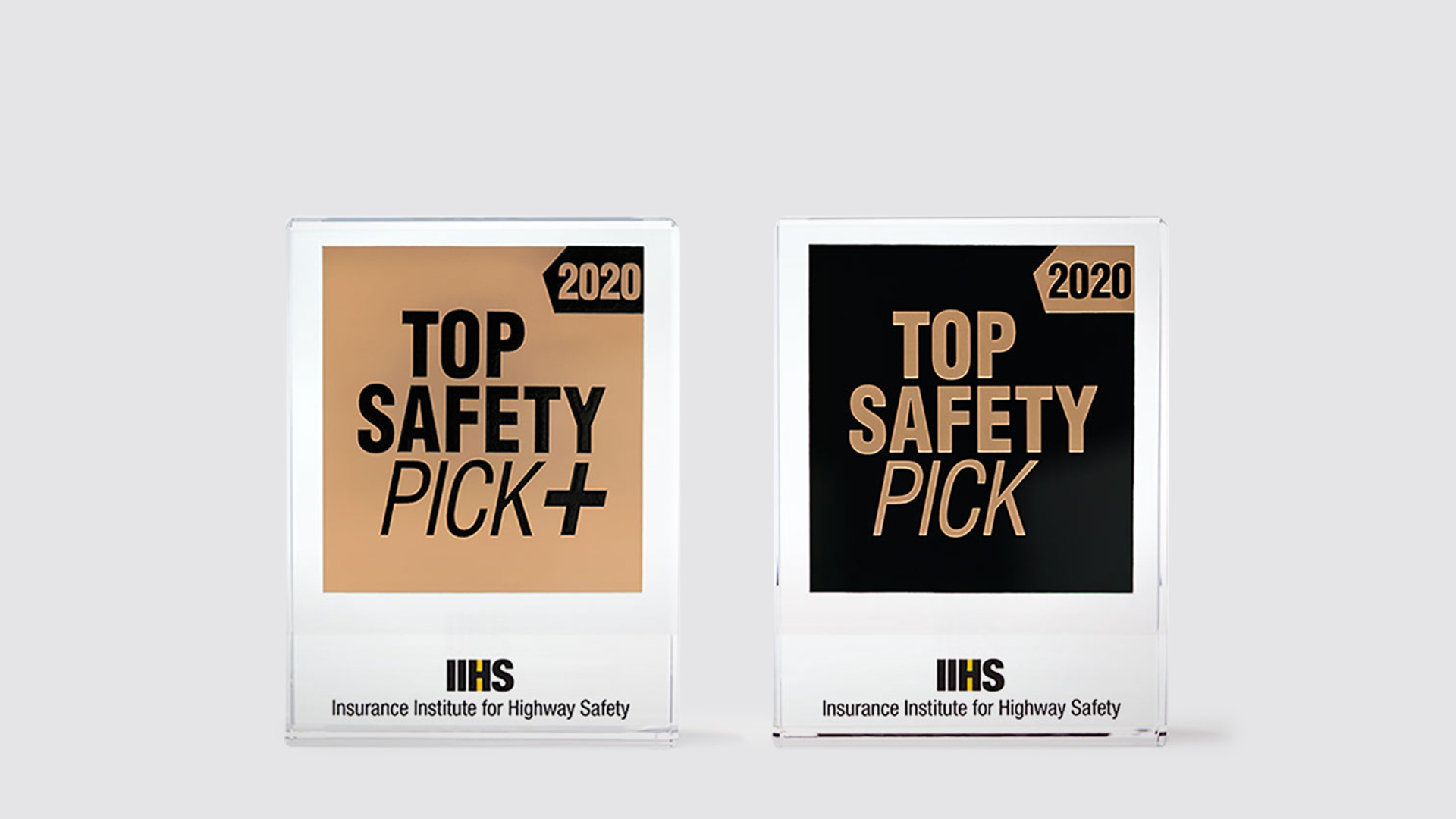
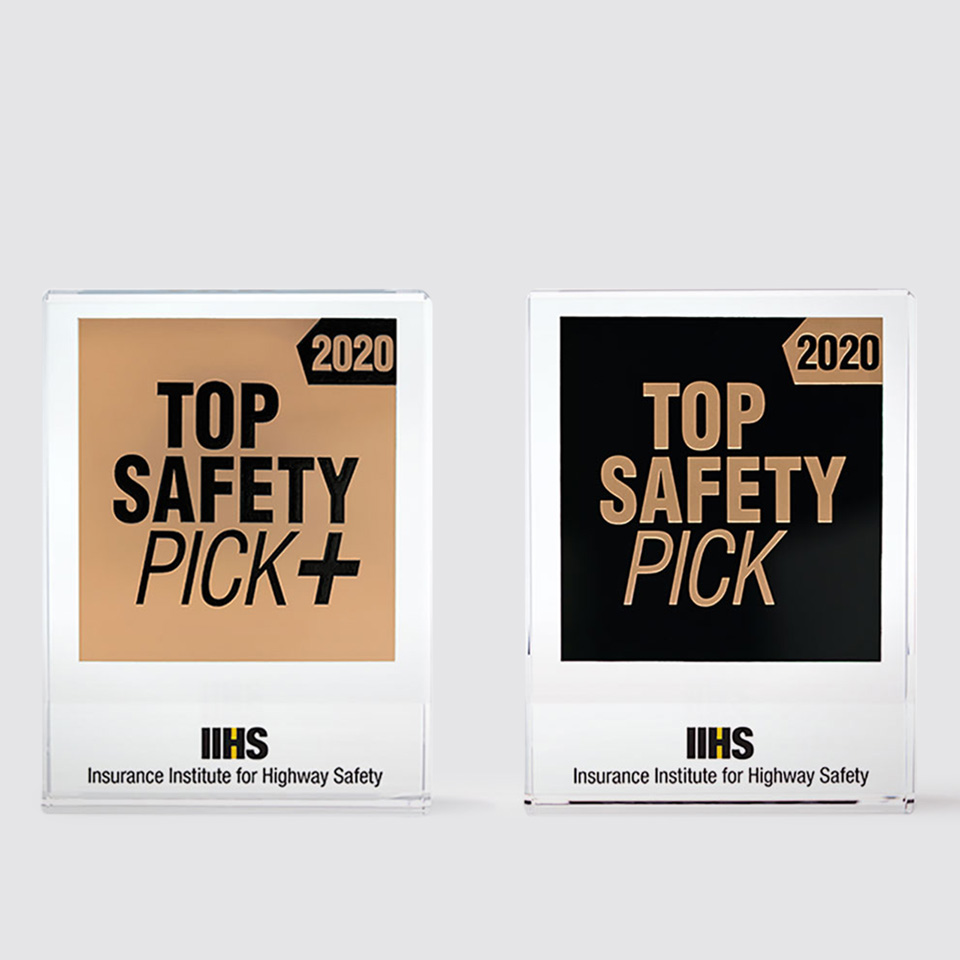


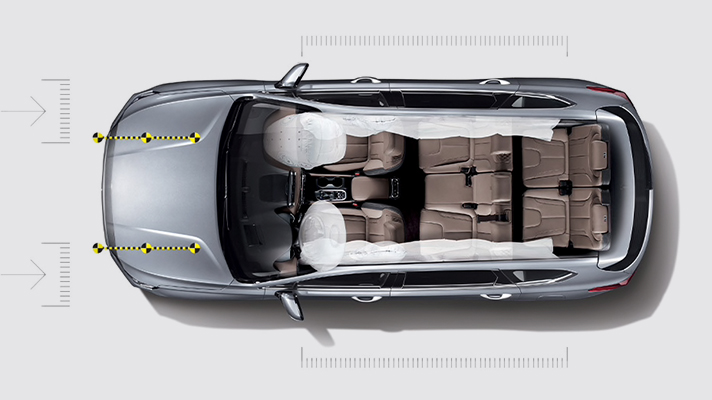
Safety is the most important quality if you manufacture a car. So automakers are pouring their resources to make their cars safe. Meanwhile, governments and organizations have been trying to measure their accurate level of safety for decades, and all these created even safer cars.
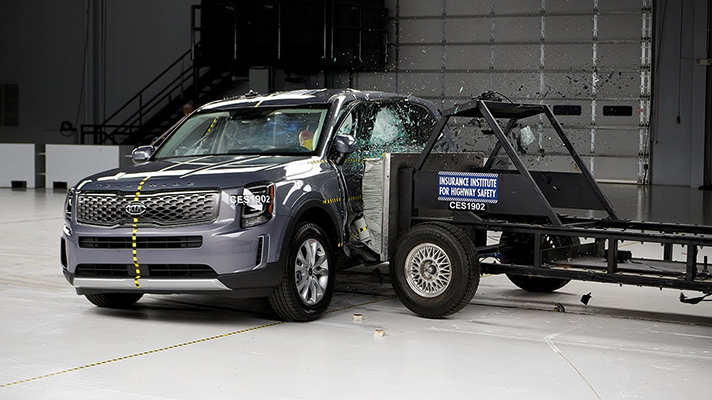
The Insurance Institute for Highway Safety(IIHS) is a U.S. nonprofit organization funded by around 80 auto insurance companies, established in 1959. Along with National Highway Traffic Safety Administration and Euro NCAP, it works to reduce the number of motor vehicle traffic collisions, and the rate of injuries and amount of property damage in the crashes that still occur. It carries out research and produces ratings for popular passenger vehicles. It also has been involved in administering plans for insurance companies.
And to qualify for a TOP SAFETY PICK+ award, a vehicle must earn good ratings in the driver-side small overlap front, passenger-side small overlap front, moderate overlap front, side, roof strength and head restraint tests. It also needs an advanced or superior rating for front crash prevention and a good headlight rating. Having good ratings in all six crashworthiness tests is getting trickier than before.
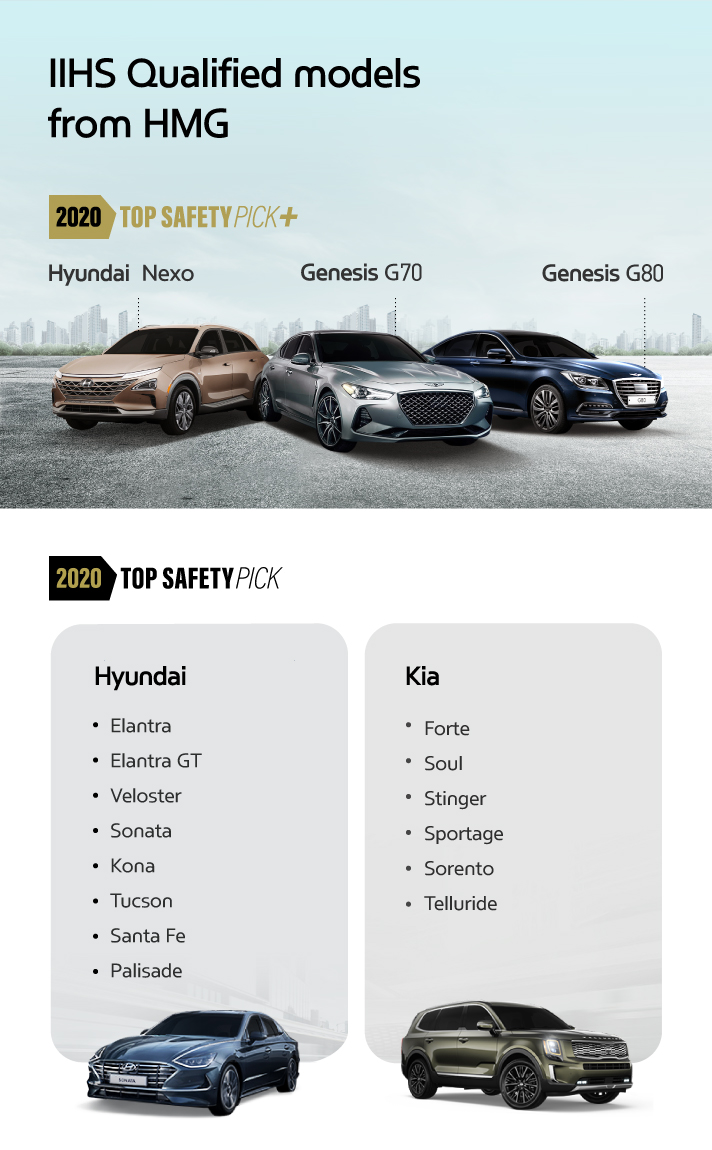
The Insurance Institute for Highway Safety(IIHS) announced that Hyundai Motor Group tied for the most combined TOP SAFETY PICK+ and TOP SAFETY PICK-rated vehicles in the automotive industry. Hyundai Motor Group received 17 in total, making it the one with most most winners overall for two consecutive years.
To qualify for a 2020 TOP SAFETY PICK or TOP SAFETY PICK+ award, vehicles must have good or acceptable headlights and available front crash prevention that earns advanced or superior ratings. The “plus” is awarded to models that come exclusively with good or acceptable headlights, making it easier for consumers to find properly equipped vehicles. Of the 64 award winners, 3 Hyundai Motor Group models qualify for TOP SAFETY PICK+ - Nexo, Genesis G70, and G80.
Eight models from Hyundai(Elantra, Elantra GT, Veloster, Sonata, Kona, Tucson, Santa Fe, and Palisade), and six from Kia(Forte, Soul, Stinger, Sportage, Sorrento, and Telluride) qualified for TSP.
For your information, 5 models from Mazda, 4 from Subaru, 2 from Mercedes-Benz, 2 from Lexus, and each one from Honda, Toyota, Audi, Nissan, Acura, and Cadillac qualified for TSP+.
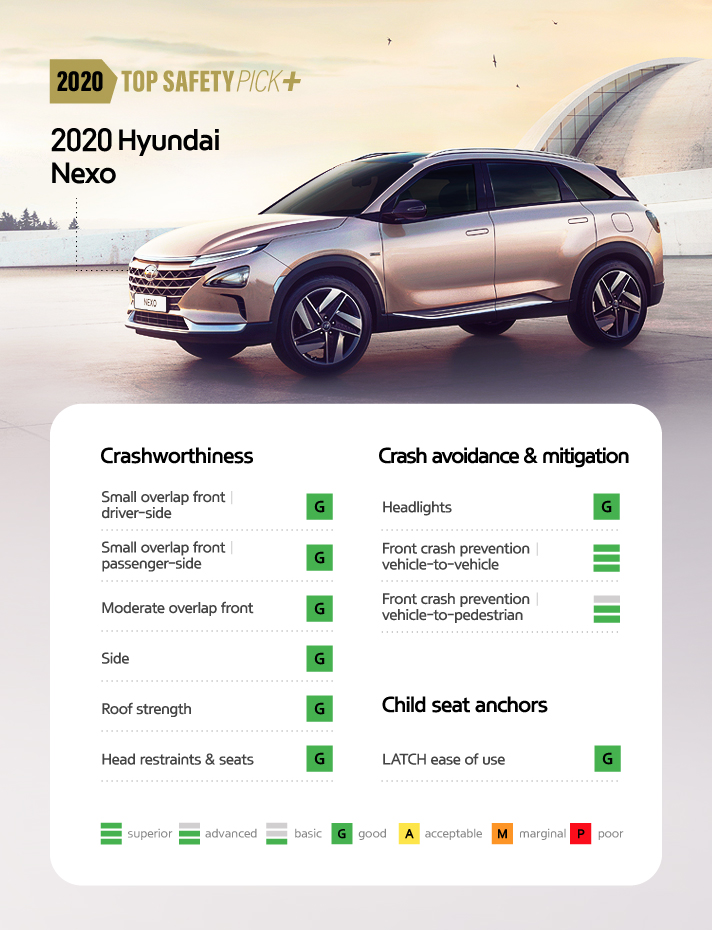
To qualify for a TPS+ award, vehicles must have good or acceptable headlights and available front crash prevention that earns advanced or superior ratings. The “plus” is awarded to models that come exclusively with good or acceptable headlights, making it easier for consumers to find properly equipped vehicles. After most of carmakers achieved a certain level of safety, IIHS decided to make tougher criteria -TPS+- back in 2013.
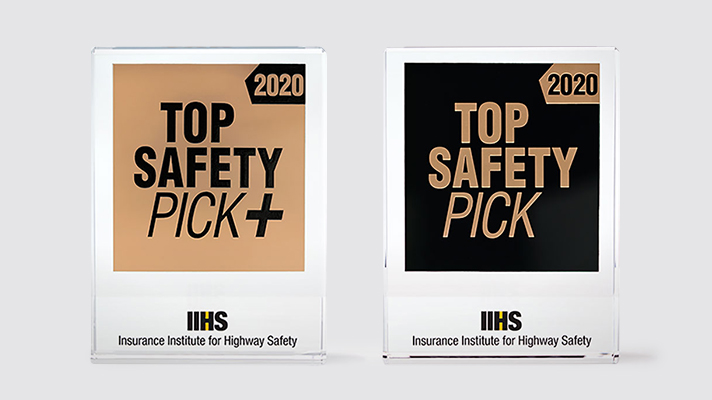
Hyundai Motor Group winning the 2020 IIHS Awards is not a surprise when considering its hard work to build safe cars. They used a new platform to deliver a significant improvement in collision safety, especially secondary, through the adoption of a multi load path structure and a high tensile steel plate.
1. Multi Load Path Structure for Advanced Collision Safety
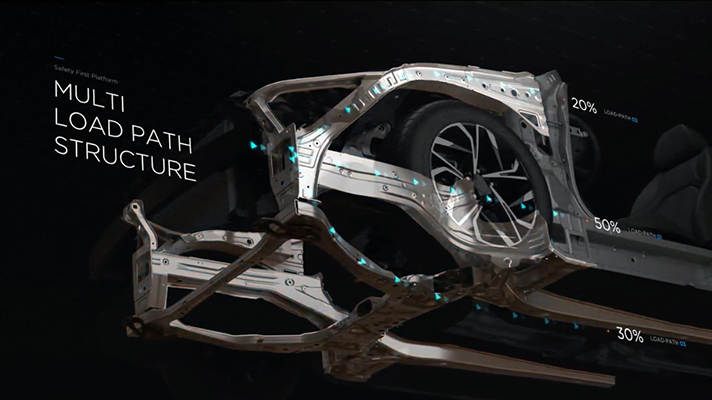
IIHS had been conducting driver-side small overlap tests since 2012. In the small overlap frontal test, cars travel at 64 km/h, but only 25 percent of the vehicles’ width strikes a rigid barrier. As a result, it became far more demanding on the vehicle structure than the previous offset test, pushing automakers to their limits.
So Hyundai Motor Group implemented a new structure called the Multi Load Path Structure. In a typical collision situation, the side members take the brunt of the collision force. MLPS organically distributes that collision force into the front side members into the subframe and the overall chassis to better brace the impact, absorbing and dispersing it via various paths.
2. Hot Stamping and Super-high-tensile Steel Plate
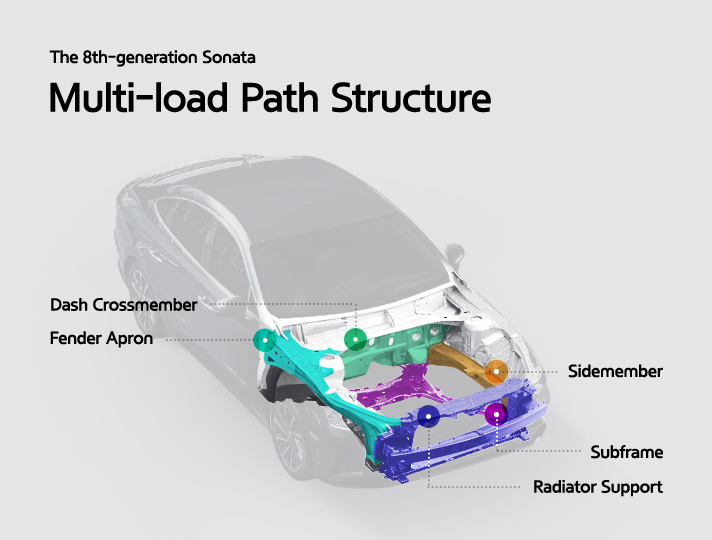
The platform delivers an improvement in collision safety through the use of a multi load path structure, Hot Stamping, and super-high-tensile steel plate. The sophisticated multi load path structure increases the energy that the vehicle absorbs in collisions. It also reduces body weight, making the 8th-generation Sonata 324.6kg, which is 24kg lighter than its predecessor. And thanks to its super-high tensile steel plate(150k), the average hardness increased by 3%(70.7kgf/㎟).
3. Tougher In-house Tests
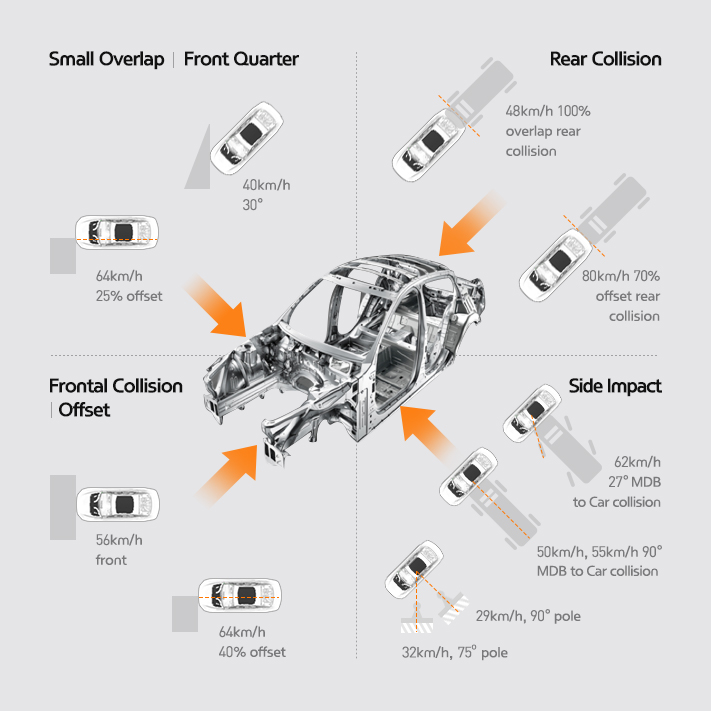
After the IIHS has adopted a Small Overlap Impact test, Hyundai Motor Group created an even tougher test for itself. For Small Overlap Test, Hyundai Motor Group does a 64 km/h frontal crash test in which 25% of the front-end of a vehicle is engaged by a rigid barrier and a 40 km/h test with a 30-degree angle. For Rear-end Collision tests, Hyundai Motor Group is conducting one at 48km/h and another one at 80 km/h with a 70% overlap. For Side Collision tests, they do one at 29 km/h with a 90-degree angle and one at 32 km/h with a 75-degree angle to a firm pillar.
The models that qualified all these tests also qualify all other safety tests, even the oned conducted by the MPDB in Europe, the Far-Side Collision test, and NCAP in North America. Speaking of which, in 2017, the IIHS began conducting this test on the passenger side of vehicles. Hyundai Motor Group is ready indeed to go through all these.
4. Advanced Technologies
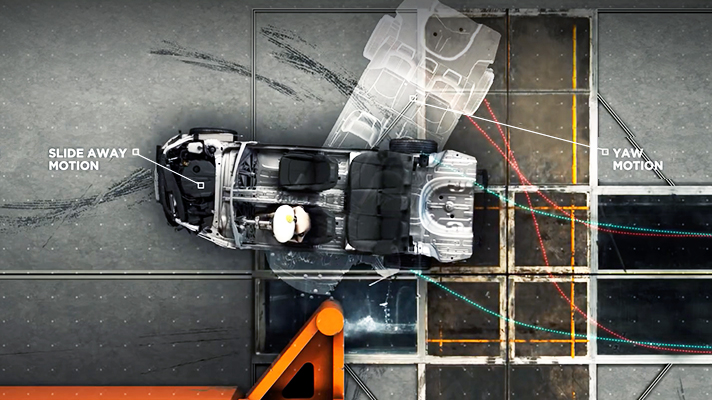
Hyundai Motor Group is implementing various advanced safety technologies to meet all criteria in the world. Among the five-star rated cars, the Hyundai NEXO was the only one FCEV who got the rating from the Euro NCAP back in 2018, and it also got the TSP+ award from IIHS. Nexo contains a technology that controls yaw moments when a small overlap collision occurs. It reduces passenger injury by detaching the wheel from the body to keep the car from spinning.
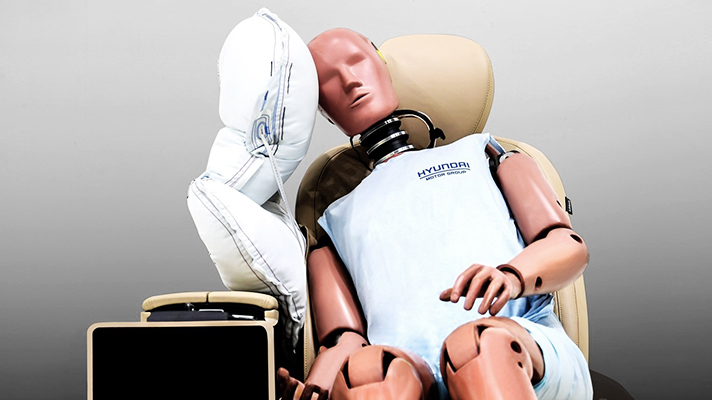
And to get prepared for the Euro NCAP Far Side test protocol starting from the upcoming 2020, a 32 km/h 75° cartorigidpole test, Hyundai Motor Group developed its own version of Center Side Airbag. The new center side airbag is also expected to diminish head injuries caused by passengers colliding with each other. This additional airbag expands into the space between driver and passenger seats to prevent head injuries of passengers in the front row as well. And in a world of self-driving cars, airbags should be able to protect the passengers regardless of their positions. This safety feature will be implemented most of the models from Hyundai Motor Group, starting from the Genesis GV80.
Institutes and organizations around the world are preparing more-rigorous crash-testing systems for new cars. Automakers need to adapt to these new tests every single day, and Hyundai Motor Group is doing its best to keep up with them and build even safer cars to protect passengers.